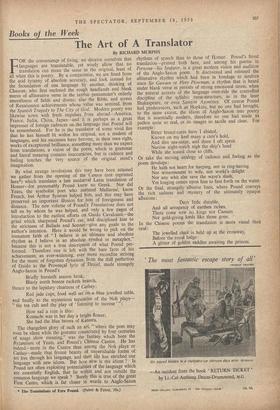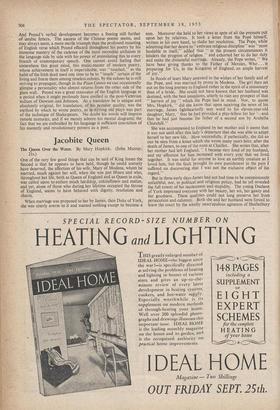Books of the Week
The Art of A Translator
By RICHARD MURPHY FOR the convenience of living, we deceive ourselves that languages are translatable, yet wisely allow that no translation can mean the same as the original, least of all when this is poetry. By a compromise, we are freed from the arid tyranny of absolute accuracy, and look instead for the fecundation of one language by another, thinking of Chaucer, who first enclosed the rough headlands and bleak mexes of alliterative verse in the iambic pentameter's orderly smoothness of fields and drains; also the Bible, and scores of Renaissance achievements whose value was seminal, from the Spanish Tragedy to The City of God. Modern poetry was likewise sown with fresh impulses from abroad—America, France, India, China, Japan—and it is perhaps as a great impresser of foreign cadences on-the language that Pound will be remembered. For he is the translator of some vivid fire that he has himself lit within his original, not a student of languages, and his successes have become, in their own right, works of exceptional brilliance, something more than we expect from translations, a vision of the poem, which in grammar and literal meaning contains inaccuracies, but in cadence and feeling touches the very source of the original mind's imagination.
By what strange involutions this may have been attained we gather from the opening of the Cantos (not- reprinted here*) which translates a late mediaeval Latin translation of Homer—for presumably. Pound knew no Greek. Nor did Yeats, the symbolist poet who imitated Mallarme, know French, but Arthur Symons helped him, and this may have preserved an important illusion for him of foreignness and distance. The new volume of Pound's Translations does not tell us by whom he was helped, and only a few pages of introduction to the earliest efforts on Guido Cavalcanti—the grind which sharpened Pound's ear, and disciplined him to the strictness of Ballade and Sonnet—give any guide to the author's intention. Here it would be wrong to pick on the immature faith of " I believe in an ultimate and absolute rhythm as I believe in an absolute symbol or metaphor," because this is not a true description of what Pound per- formed. Therefore one is left with the bare facts of his achievement, an ever-widening, ever more recondite striving for the music of forgotten dynasties, from the dull perfection of Guido to the Provencal lyric of Daniel, made strangely Anglo-Saxon in Pound's Briefly bursteth season brisk, Blasty north breeze racketh branch, thence to the lapidary clearness of Cathay: Red jade cups, food well set on a blue jewelled table, and finally to the mysterious tapestries of the Noh plays- " the tea cult and the play of listening to incense' ": How sad a ruin is this: Komachi was in her day a bright flower; She had the blue brows of Katsura.
The changeless glory of such an art, " where the poet may even be silent while the gestures consecrated by four centuries of usage show meaning," was the fantasy which bore the Byzantium of Yeats, and Pound's Chinese Cantos. He has indeed—more in the Cantos than among the Noh plays or Cathay—made that frozen beauty of imperishable forms of art live through his language, and their life has enriched our language with new idiom. But how new is the idiom ? • Is Pound not often exploiting potentialities of the language which are essentially English, that lie within and not outside the common language we speak ? Surely this is true of the great First Canto, which is far closer in words to Anglo-Saxon * The Translations of Ezra Pound. (Faber & Faber, 30s.) FROM COLLINS, PUBLISHERS OP THE WOODEN HORSE . 12s, 6d, rhythms of speech than to those of Homer. Pound's finest translation—printed both here, and among his poems in Personce—his Seafarer, is a great modern vision and audition of the Anglo-Saxon poem. It discbvered and released the alliterative rhythm which had been in bondage to iambics since Sir Gawatn or Piers Plowman, a rhythm that is heard under blank verse in periods of strong emotional stress, when the natural accents of the language over-ride the controlled discipline of the syllabic verse-structure, as in the later Shakespeare, or even SamsOn A gonistes. Of course Pound had predecessors, such as Hopkins, but no one had brought, to the same extent, the idiom of Ariglo-Saxon into poetry that is essentially modern, therefore no one had made its pathos quite so real, or its images so tactile and clear. For example: Bitter breast-cares have I abided, Known on my keel many a care's hold, And dire sea-surge, and there I oft spent Narrow night-watch nigh the ship's head While she tossed close to cliffs.
Or take the moving analogy of cadence and feeling as the poem develops: He hath not heart for harping, nor in ring-having Nor winsomeness to wife, nor world's delight Nor any whit else save the wave's slash, Yet longing comes upon him to fare forth on the water.
Or the final, strangely allusive lines, where Pound conveys the rich sadness and mystery of the ultimately opaque allusions: Days little durable, And all arrogance of earthen riches, There come now no kings nor Caesars Nor gold-giving lords like those gone.
In the Chinese poems the translation is more visual than oral: The jewelled chair is held up at the crossway, Before the royal lodge: A glitter of golden saddles awaiting the princes.
And Pound's verbal development becomes a freeing still further of iambic fetters. The success of the Chinese poems seems, and may always seem, a more sterile triumph than the profound recasting of English verse which Pound effected throughout hiS poetry by his immense mastery of the cadence of the most recondite archaism in the language side by side with his power of assimilating this to every branch of contemporary speech. One cannot avoid feeling that somewhere this great mind, this music-master of modern poetry, whose achievement in itself is imperishable, was "touched," as the habit of the Irish dead used one time to be to "touch" certain of the living and freeze them among timeless echoes, by the echoes he is still striving to propagate, though in the Pisan Cantos we can occasionally glimpse a personality who almost returns from the other side of the glass wall. Pound was a great renovator of the English language at a period when it might perilously have ossified in the post-Victorian tedium of Dowson and Johnson. As a translator he is unique and absolutely original, for translation, of his peculiar quality, was the method by which he wrote poetry, as re-writing old plays was part of the technique of Shakespeare. No doubt his words will impress remote centuries, and if we merely admire his mental diagrams; the fact that we are enthralled by his language is sufficient conviction of his masterly and revolutionary powers as a poet.



































 Previous page
Previous page